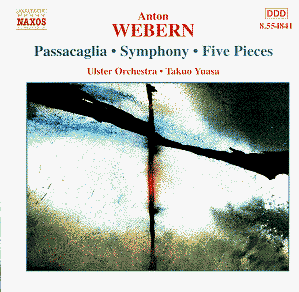"A note up here, a note down there, the music
of a madman" thus spoke Anton Webern after a performance of the
Symphony, and if it was a badly prepared performance this is exactly
how it can sound. I must immediately say that these are not in any way
poor performances. In fact these are superb performances and mostly
very gripping.
Webern is very much a composer who is more talked about
than heard certainly in public, so it is a wonderful thing that Naxos
and the Ulster Orchestra have tackled this composer at a time when the
industry is said to be in crisis. Many musicians own the scores, as
indeed I do, but how often do we refer to them. At present it seems
to be almost sinful to admit to enjoying 12-tone music. Well beware,
you may well enjoy this CD. This is great music very finely performed.
The three periods of Webern's career are illustrated;
the Passacaglia in the late-romantic style found in early Schoenberg
secondly the atonal style of Opp. 5, 6 and 10, and the serial compositions
represented by Op 21 and Op 30.
Let me begin with two small quibbles. The Passacaglia
begins with the theme in the bass as is usual, in the lower strings.
It should be audible without having the volume extraordinarily high.
I turned it up considerably and then was blasted out at the big climax.
Two other versions that I know do not fall into this trap. Karajan (on
a DG triple CD set 427 424-2) has the opening too loud in relation to
what is to come. Boulez (complete works triple box set Sony SM3k 45845)
has the balance just right, I feel.
My second quibble concerns the orchestral balance,
where sometimes the strings seem to be under-recorded. For instance
the Op 6 orchestral Pieces are a set of musical micro-organisms. Each
instrument is of equal importance but the strings are thinner than is
needed. The amazingly beautiful Op 10 no 2 is likewise a slight problem.
The timings on these works set the scene. The longest
work, at almost 12 minutes, is the Op 6, which consists of six pieces
of which the fourth is the extraordinary funeral march. This comes off
brilliantly and is superbly recorded.
Yuasa’s approach is generally not as spacious as Karajan
and in the Symphony and the Variations is even quicker than Boulez.
Mostly this works well but there are times in the Variations when I
wish that he would linger over a few details. Karajan’s Passacaglia
is two minutes slower than Yuasa as he draws out the Romantic atmosphere.
The Karajan approach draws out not only the antecedents of this work
but perhaps also of all Webern. Even the late works are nothing other
than brief, quiet, self-effacing Romantic gestures.
The later music comes off better than the earlier pieces
and it is interesting that the strictly serial pieces with their tighter
control may be easier to conduct than the aphoristic statements of,
say, the atonal Op 10. In the Variations certain lines, yes I’ll say
it, melodies, are heard over again always in slightly different
guises helping players and listeners through the textures. In Op 10
you have gestures, which are no sooner come than gone - a sprinkling
of celeste, a side drum roll, a viola tremolando, all perhaps diffuse
and totally outside normal form and development.
I should add that these works do not constitute Webern’s
complete orchestral works. He orchestrated a Bach Fugue and some Schubert
German Dances that Boulez recorded. There is also an even earlier very
Romantic work ‘Im summerwind’ for orchestra and I suppose the concerto
Op 24 for nine instruments. There was certainly room on this CD for
at least a little more. Incidentally I am not going to say that at less
than a fiver one shouldn’t complain because full length CDs as well
high quality performances are an expectation and not an after-thought
at any price.
To sum up then a fine CD with much to interest any
music lover and very sensitively played.
Gary Higginson


